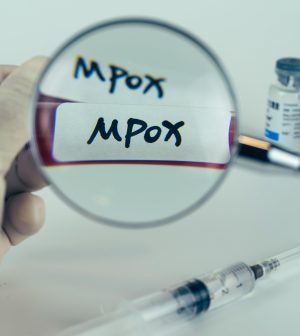- Could Your Grocery Store Meat Be Causing Recurring UTIs?
- Are You Making This Expensive Thermostat Error This Winter?
- Recognizing the Signs of Hypothyroidism
- 10 Strategies to Overcome Insomnia
- Could Artificial Sweeteners Be Aging the Brain Faster?
- Techniques for Soothing Your Nervous System
- Does the Water in Your House Smell Funny? Here’s Why
- Can a Daily Dose of Apple Cider Vinegar Actually Aid Weight Loss?
- 6 Health Beverages That Can Actually Spike Your Blood Sugar
- Treatment Options for Social Anxiety Disorder
CDC Warns That Mpox Could Make a Summer Return

Public health officials are urging people at risk of contracting mpox, the virus previously called monkeypox, to get vaccinated.
They are concerned that a slowdown in infections since last summer may not continue.
“There’s a very real risk of there being a surge in mpox cases over the next few months. Most likely, it won’t be anywhere near as big as it was last year, and that is because many people at risk were either infected or vaccinated,” Dr. Jay Varma, director of the Center for Pandemic Prevention and Response at Weill Cornell Medicine in New York City, told CNN.
Varma expressed uncertainty about how long protection from infections or vaccinations lasts.
In an official update posted Monday on its Health Alert Network, the U.S. Centers for Disease Control and Prevention warned: “Spring and summer season in 2023 could lead to a resurgence of mpox as people gather for festivals and other events.”
The CDC is investigating a cluster of mpox cases in the Chicago area. It included 12 confirmed cases and one probable case. All involved men between the ages of 24 and 46.
Among the 13 cases, nine had received the two-dose Jynneos vaccine. Four had traveled recently to New York City, New Orleans and Mexico.
Previous outbreaks were mostly related to international travel, but the virus spread rapidly across the world last spring through person-to-person contact. Cases disproportionately affected gay and bisexual men and transgender people, according to the CDC. The outbreak prompted a campaign for people at risk to get vaccinated.
Despite breakthrough cases, vaccination can reduce infection severity, the CDC said.
“There’s a real concern that the vaccination level of the people most at risk is not where we need it to be, and we now are experiencing a new outbreak of cases in the Midwest that includes previously vaccinated individuals, although the symptoms appear to be milder for those who had some protection from vaccine,” Lori Tremmel Freeman, chief executive officer of the National Association of County and City Health Officials, told CNN.
Varma said the vaccine is safe and effective and helped reduce transmission last year.
“Even though there is some uncertainty about whether or not it’s 80% or 90% or 100% effective and how long it’s effective, we do know that you’re better off being vaccinated than being unvaccinated,” said Varma.
He also serves on the board of directors at SIGA Technologies, which developed the smallpox antiviral drug Tpoxx. It is being studied in clinical trials as a treatment for mpox.
Only 1 in 4 people considered high risk for mpox is vaccinated, according to CNN.
The virus’ symptoms include a blister-like rash, fever, chills, swollen lymph nodes, aches and fatigue. It can be fatal for those with weakened immune systems.
The World Health Organization last week declared that mpox was no longer a global health emergency, but that doesn’t mean the work is over, said WHO Director-General Tedros Adhanom Ghebreyesus. The disease continues to affect communities in all regions, he said.
David Harvey, executive director of the National Coalition of STD Directors, told CNN in an email that mpox remains a “grave concern” and needs to be on the radar of communities and health care providers.
“One year ago this week, we experienced an unprecedented outbreak of mpox. The public health sector — and especially those of us who work on [sexually transmitted infections] — quickly rallied to push for a strong response. Ultimately, more than a million doses of the vaccine were distributed. Still, many people did not get vaccinated — especially as case numbers dropped,” he wrote.
While anticipated, the Chicago cases are concerning, Harvey said.
“We continue to be concerned about wider spread throughout the summer and festival season,” he said. “The good news is that we know what works and we have the tools at hand in the event of another outbreak to curb cases once again. The vaccine is safe and effective, and it helps reduce cases and lessen the severity of symptoms.”
More information
The World Health Organization has more on mpox.
SOURCES: U.S. Centers for Disease Control and Prevention, health update, May 15, 2023; CNN
Source: HealthDay
Copyright © 2026 HealthDay. All rights reserved.










